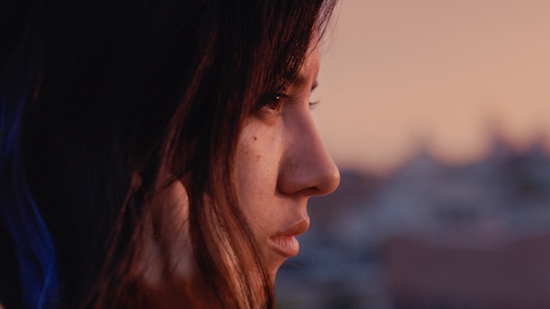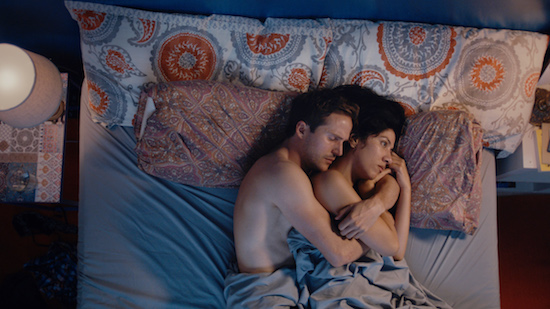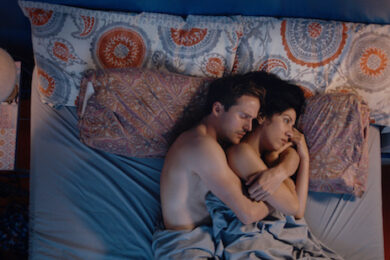Photo Credit: Imagination Worldwide / The Film Collaborative
After winning the Narrative Feature Competition at last year’s SXSW Festival, Jessica M. Thompson’s The Light of The Moon arrives on VOD through Amazon Prime. Thompson’s debut directorial feature is a timely and sensitive depiction of post-trauma and of a culture that intentionally or otherwise, seeks to perpetuate women’s victimhood.
After a night out with her co-workers, Bonnie (Stephanie Beatriz) is raped as she walks home. Her boyfriend, friends and co-workers naturally rally round to support her, but in the immediate aftermath, Bonnie is emotionally distanced from the people around her, leaving her to ultimately work through her ordeal on her own.
The opening scenes of The Light of The Moon set the film up as more of a romantic comedy-drama; her co-worker Jack (Conrad Ricamora) is framed as the ‘best friend’ character of the romantic lead; meanwhile boyfriend Matt (Michael Stahl-David) ditching her at the last minute to go on his own work night out hints at future dramatic tension. The light pastel colours of Bonnie’s office space further reinforce our expectations that we’re in for a relatively enjoyable if bland romantic story.
As a consequence, the effect of the rape on the story is initially one of shock – telegraphed only moments before by a change in lighting and a handheld camera, the attack emphasises Bonnie’s perspective as it seems to come out of nowhere, radically altering the direction we were expecting the story to go in.
Indeed, audiences jaded by the ubiquitous and problematic use of rape as a plot device could be forgiven for flinching from yet another use of such a tired trope. Yet, part of why The Light of the Moon works so well is in eschewing the narrative clichés that so often derive from such a story beat in favour of a tender and complex psychological portrait of the character who matters most in this story.
Compare this to the use of rape as a plot device in Oscar contender Three Billboards Outside Ebbing, Missouri – an excellent film, but one that nevertheless uses the off-screen rape of an unseen woman as a device to advance the development of other characters. With The Light of The Moon, Thompson has no truck with such tricks, challenging a rape culture that marginalises and simplifies its victims by placing Bonnie front and centre.

The film’s visuals consistently reinforce the primacy of Bonnie’s experience, and the tension arising when the people around her insist on centring themselves in her trauma. Cinematographer Autumn Eakin prioritises close ups and handheld shots over flashy camera work, often shooting her subjects with flat angles that privilege the pained, awkward conversations between her and Matt. In one scene, as Matt prepares dinner for them, Bonnie quips that all she had to do for him to finally cook for her was to get raped. It’s a perfectly-pitched moment: Bonnie’s facetiousness is a momentary attempt to gain control of her own trauma, yet Matt’s instinctive reaction is one of distaste. Matt’s legitimate sharing of Bonnie’s pain is muddied by his assumption of Bonnie’s victimhood: his remark that ‘you never needed this before’ betrays his past negligence as a partner as well as the insertion of himself into Bonnie’s emotional experience.
Later, Bonnie’s workmates insist on walking her home after another night out, despite her insistence that she feels safe. These exchanges can be juxtaposed with the police officers’ earlier pointed questions about how much she had to drink on the night, and how flirtatious she was with men in the bar. While the officers’ questioning is a clear-case of victim blaming (or at best, an attempt to work within a system that blames victims for their own rape), Bonnies’ friends’ well-meaning attempts to look after her unwittingly perpetuate the denial of her autonomy.
Matt and Bonnie’s colleagues unwittingly try to centre themselves in the film’s narrative, but its visuals make no such mistake, drawing out Beatriz’s nuanced performance. Beatriz’s portrayal of Bonnie alchemises the comic toughness of her badass cop persona in Brooklyn Nine-Nine with a complex, authentic vulnerability.
Although the cinematography works to prioritise Beatriz’s superb performance it also serves a second purpose in creating a sense of claustrophobia and isolation by both hemming the characters in and isolation from each other; each close up a visual reminder of Bonnie’s rape, shot in a darkened alley in extreme close up while the attacker’s face is obscured out of frame. It’s telling that when Bonnie and Matt have sex, the camera maintains a comfortable distance, yet when she is raped we intrude into Bonnie’s personal space, making us both witness to and complicit in the crime.
The Light of the Moon offers no easy answers. Her friends truly wish to help and Matt loves Bonnie and wants to help her as best he can, yet their continued insistence on ‘half-assed shoulder rubs and random boxes of chocolates at work’ evoke the insidiousness of rape culture. That even Bonnie’s well-meaning loved ones attempts to help all centre around controlling her behaviour is crucial. Even Bonnie herself, when she berates another lone young woman walking at night with headphones in, participates in the culture of victim blaming and controlling women. Meanwhile, the rapist is protected by an indifferent criminal justice system and institutionalised misogyny.
Thompson’s film is an intelligent and mature examination of the post-traumatic experience of sexual assault, depicting how even the good intentions of well-meaning people perpetuate a toxic culture of blaming and controlling victims. In eschewing trite, easy solutions to a complex issue, Thompson’s debut feature is a difficult, complex work, but one that ultimately achieves catharsis through its sensitivity and a terrific central performance. While the Oscar crowd scramble to heap praise on the likes of I, Tonya and Lady Bird, The Light of The Moon quietly marks itself out as one of the year’s best indie pictures.
The Light of the Moon is available now on various video-on-demand services



